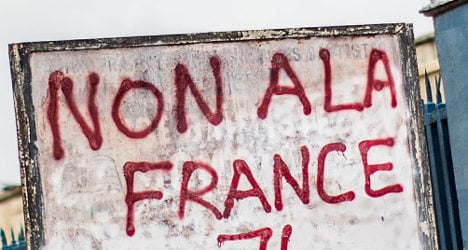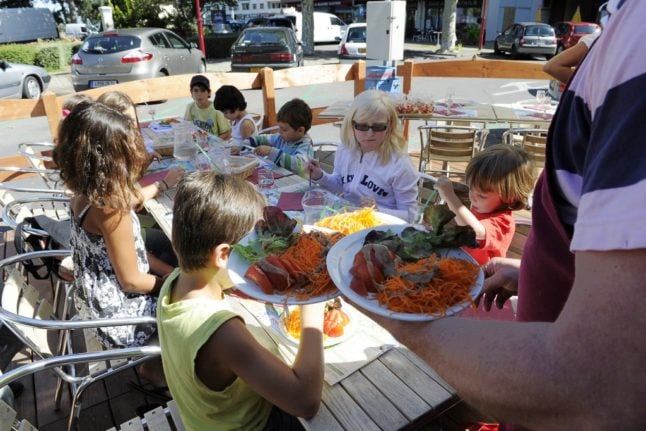French Bashing: A combat sport invented by Anglo Saxons to criticise the lazy, striking, effeminate, cowardly, unfaithful, seducing, impolite, unhygienic, arrogant, cheese-munching French.
This definition of the popular sport played by both Americans and British is given at the start of “French Bashing”, a documentary by filmmaker Jean-Baptiste Péretié, which was aired on Canal Plus on Wednesday
The programme captured the attention of a French public ever keen to understand what those Outre-Atlantique and Outre-Manche think of them.
During Wednesday night’s screening the hashtag #Frenchbashing topped the trending charts on Twitter in France, as viewers discovered why exactly the Brits and the Americans love to bash them so much.
Guys #FrenchBashing is Trending top. source: http://t.co/tcGcGmcwq8 pic.twitter.com/piI6tgCSTD
— TrendsinFrance (@FranceTrending) September 10, 2015
The programme explains the origin of many of the derogatory clichés mentioned above.
Apparently much of the anger from the other side of the Atlantic apparently originated in the 18th Century when France and the US competed to be the country that most upheld the principles of freedom and the rights of man following their revolutions.
Much has happened since then of course that has only fueled resentment from across the seas and helped confirm the unfair clichés of the French that many Americans and Brits still hold dear.
There was Charles de Gaulle pulling France out of Nato and the President Jaques Chirac’s refusal to join the Iraq War of 2003 that lead to Tricolore flags being burned in America and French Fries to be renamed or Freedom Fries.
That stance, which even those who backed the war would find hard to fault now, was taken by many Anglos as proof of the legendary French cowardice dating back to the surrender in World War Two.
Then there was Dominique Strauss-Kahn’s sordid hotel sex scandal that led to him being dubbed “Le Perv” and taken as evidence that all French men are cheaters and unable to control their ravenous sexual appetites.
Then there’s the cartoon version of DSK – Pepe le Pew, a smelly French skunk that is desperately seeking to find l’amour” with a cat and won’t take no for an answer.
Then there’s the constant strikes, the struggling economy, the apparent refusal to reform, the pessimism, Fox News’s famous ‘no-go zone’s in Paris and even the dog poo on the pavements.
The programme however ended on a moment when the eyes of the Anglo world looked to France with a certain degree of respect, when millions took to the streets in the aftermath of the January terrorist attacks.
SEE ALSO: From Nelson to Newsweek: a brief history of French bashing

But if the reaction from the viewers who took to Twitter are anything to go, the journey through the tired clichés of the French has simply reaffirmed their Gallic pride rather than jolted them into more soul searching and pessimism.
French international rugby player Benjamin Kayser was one of hundreds who took to Twitter to express their pride at being French.
“Nothing as good as French Bashing, the documentary from Canal Plus, to make you feel proud to represent France, before crossing the Channel on Saturday,” said Kayser, who is on his way to England for the Rugby World Cup.
Rien de tel que #FrenchBashing le doc de @canalplus avant de traverser la manche samedi et de représenter fièrement la France!
— Benjamin Kayser (@BenjaminKayser) September 10, 2015
Other viewers simply tweeted along the lines of “Good reasons to feel proud to be French”.
Definitely proud to be french ! #FrenchBashing @canalplus
— Vincent LE DU (@vincentledu) September 9, 2015
“We are watching French bashing on Canal and instead of feeling shame we are almost proud,” tweeted Les Tonton Flingues.
On regarde #frenchBashing sur Canal ben au lieu d’avoir honte on est presque fier. On est des cons non ?
— Les Tontons Flingués (@TontonsFlingues) September 9, 2015
Others took the opportunity to partake in a little “Yank Bashing”, with one tweeter mocking the fact that some Americans still think the Iraq war was a good idea.
“Funny to see how Americans still think that the war in Iraq was a good idea. What a load of idiots,” tweeted Lucio.
Another joked about the cliché of French spending their days drinking coffee, yet Americans probably spend more time in Starbucks.
“We learn the French spend all their day in a café… but who invented Starbucks?” tweeted D4DO_greg.
While the French may understand the origins of the sport of French bashing a little better, they should probably be prepared for it to continue.
But for the sake of balance it’s worth pointing out that it’s not always been bashing from across the pond. Just watch this video from US comedian and commentator Bill Mayer.



 Please whitelist us to continue reading.
Please whitelist us to continue reading.
Member comments